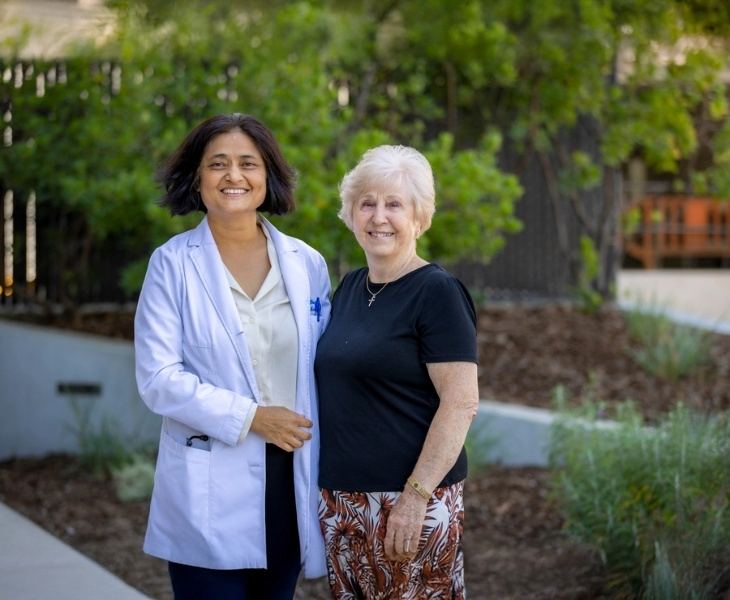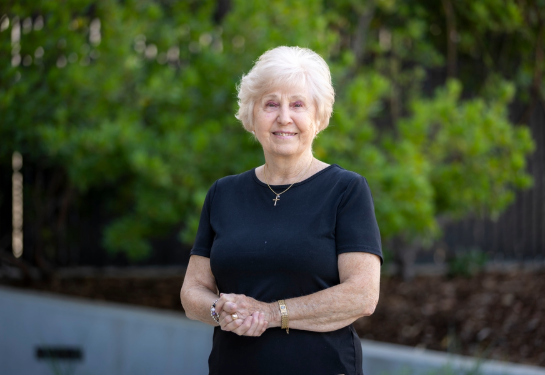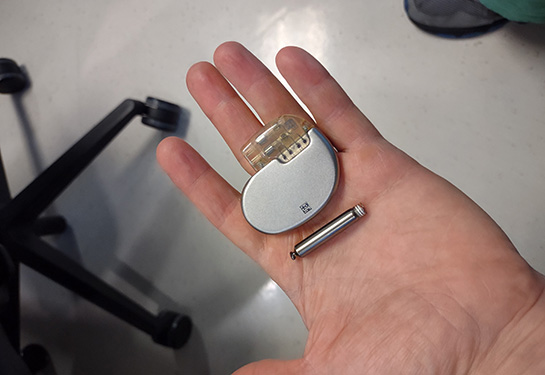Patient finds hope after a decade of dangerous blood pressure spikes
UC Davis Resistant Hypertension Clinic offers minimally invasive procedure to improve lives
Else Carr has faced more than her fair share of health challenges. But one of the most frightening was her struggle with resistant hypertension — a form of high blood pressure that doesn’t respond well to medication.
Her ordeal began in 2012 when her blood pressure spiked to over 200/100, sending her to the emergency department. Despite extensive testing, doctors couldn’t identify a clear cause. After a second emergency department visit just days later, she was told that unless her blood pressure remained consistently above 200, she was not in immediate danger.
A few years later, while dining out, Carr suddenly lost her vision and blacked out. She has no memory of being helped out of the restaurant — only of regaining consciousness while sitting outside. Her family rushed her to the emergency department. Carr was referred to a cardiologist and began receiving more specialized care.
Her cardiologist prescribed medications to help stabilize her blood pressure, but it continued to swing wildly. At times, her blood pressure would dangerously spike above 200, and at others, it would plummet below 80 — sometimes within the same day.
“My cardiologist tried many different medications and dosages,” Carr shared. “But it kept fluctuating. It especially affected me when it dropped: I couldn’t focus, felt sluggish, and had to lie down until it stabilized.”

A turning point
Eventually, Carr was referred to the UC Davis Resistant Hypertension Clinic, where she met with Surabhi Atreja, an associate professor of cardiology at UC Davis Health. Atreja introduced her to a promising new treatment called renal denervation.
Renal denervation is a minimally invasive procedure that targets overactive nerves in the arteries leading to the kidneys. These nerves can contribute to high blood pressure. Using ultrasound energy, doctors disrupt these nerves, helping to lower blood pressure safely and effectively.
“Renal denervation has proven especially beneficial for patients like Else, whose blood pressure remains elevated despite taking multiple medications,” explained Atreja. “This procedure represents a breakthrough in managing resistant hypertension, offering a safe and effective alternative when traditional therapies fall short.”
Carr was intrigued but cautious about the treatment option, which is done with a small incision in the groin. She took time to research the procedure and consulted with family members in the medical field. Reassured by its safety and effectiveness, she decided to move forward with the treatment.
“Renal denervation has proven especially beneficial for patients like Else, whose blood pressure remains elevated despite taking multiple medications. This procedure represents a breakthrough in managing resistant hypertension, offering a safe and effective alternative when traditional therapies fall short.”—Surabhi Atreja
Life after the procedure
After just one night in the hospital for observation, Carr was discharged and went home. She was amazed by how smooth her experience went.
“The staff at UC Davis was amazing — so kind and caring,” Carr said. “I stayed overnight as a precaution, but I had no issues at all.”
Since the procedure, Carr’s quality of life has changed dramatically. Her blood pressure now stays between 120 and 150, and she no longer experiences the dangerous highs and lows that once dominated her days. She has also been able to cut back on medications, which saves money and avoids side effects.
“I don’t have to lie down every day anymore. I feel more stable, more in control,” she shared. “I am glad I did the procedure.”
A leader in cardiovascular care
The UC Davis Health Resistant Hypertension Clinic opened in 2024 to help people with high blood pressure that’s hard to treat. The clinic offers full support, including remote blood pressure checks, helpful text reminders, and detailed testing to determine what’s causing the problem.
UC Davis Medical Center was also the first hospital in Northern California to perform renal denervation outside of clinical trials.
“Our heart care program is known for using the latest research and giving great care to patients,” said Atreja. “We have a team of expert doctors who work hard to make sure patients feel safe and supported.”
If you’re taking three or more medications and your blood pressure is still high, you might have resistant hypertension. You don’t have to live with the symptoms or risks anymore.
Talk to your doctor about getting a referral to the UC Davis Resistant Hypertension Clinic.





